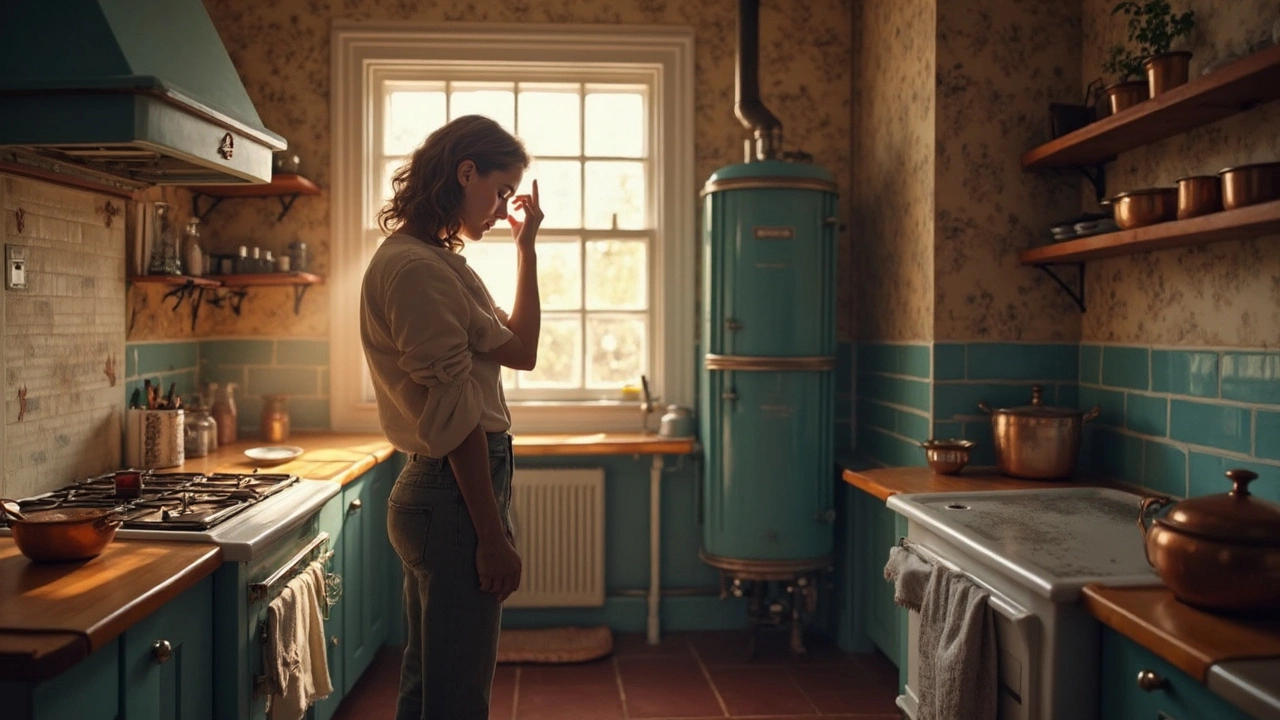Ever found yourself staring at a hefty boiler replacement bill and wondering why it's so darn expensive? You're not alone. Boilers are like the unsung heroes of our homes, chugging along quietly until something goes awry. But when they do kick the bucket, getting a new one feels like paying for a new car! What gives?
The cost isn't just about the boiler itself, although, yes, they're pricey little beasts on their own. You see, there’s a whole parade of hidden expenses that tag along with a boiler swap that often catch people off guard. We're talking permits, inspections, and heaven forbid if your home's setup means extra work for the installer.
Then there's the talent you need to get the job done. Skilled labor doesn’t come cheap, especially when the task at hand requires a specific set of skills. It's not a matter of plugging in a new appliance; it’s about ensuring everything's hooked up and running like clockwork—safe and sound.
- Hidden Costs in Boiler Replacement
- Labor and Expertise: Why It Adds Up
- Installation Woes: Complexity and Time
- Smart Shopping: Avoiding Common Pitfalls
- Alternative Solutions to Boiler Replacement
Hidden Costs in Boiler Replacement
Picture this: You've just picked out a shiny new boiler, and you're bracing yourself for the costs. But wait, there's more than meets the eye. The actual price tag is just the tip of the iceberg. Let me walk you through the sneaky extras you weren't expecting.
Firstly, there's the pesky permits. Depending on where you live, local regulations might require you to get permits before swapping out your old boiler. These permits ensure everything is up to code, but yep, they come with a fee. And don't be shocked if you need an inspection afterward to certify that it's all done right.
Then, there's something called system flushing. It sounds fancy, but it's just a way of cleaning out the pipes to make sure your new boiler runs smoothly and doesn't mix with any leftover gunk. Technicians will often suggest it to increase your new boiler's lifespan, but of course, this additional service isn't free.
You might also face costs related to upgrading other parts of your home. For example, if your current system is outdated, extra work might be needed to make everything compatible with the new equipment. This can include updating electrical hookups or parts of your heat distribution system.
To add another layer, disposal fees for your old boiler might sneak into the bill. The company taking out your old unit has to get rid of it somehow, and oddly enough, taking it away can cost nearly as much as a new water heater installation!
Lastly, remember not all installers are the same, some add transportation fees if you're not within a certain radius of their base. So, always check that tiny fine print when choosing a service.
I know, it's a lot to digest. Just keep in mind these hidden costs when planning for a boiler replacement. It'll save you a surprise hit to your wallet later!
Labor and Expertise: Why It Adds Up
Alright, so replacing a boiler doesn't just involve swapping out the old with the new. It's a bit like surgery for your home’s heating system. You need someone skilled enough to know what they're doing and, well, these folks aren’t working for peanuts. A big chunk of the cost is the labor involved.
A professional installer typically charges quite a bit, and for good reason. This isn't a task you want to DIY unless you've got some serious expertise under your belt. They ensure everything's done up to code, which is crucial for safety and efficiency. Danger and high costs can arise if things get botched. Not all boilers are created equal—some require more complex setups, like updating piping or installing new vents, which naturally ups the hours involved.
If the installation demands modifications to your current system, like rewiring or adding support for new units, you're looking at more labor and higher costs. The pay reflects their need for precise and exact work.
| Task | Estimated Cost |
|---|---|
| Basic Installation | $700 - $1,000 |
| System Modification | $500 - $1,500 |
| Permits and Inspections | $100 - $300 |
Remember, these pros also save you from the headache of dealing with the nitty-gritty details, like securing permits, scheduling inspections, and ensuring everything meets those pesky regulations. It's not just turning a wrench; it's about ensuring your heating system runs smoothly without hiccups—especially when you need that warmth!

Installation Woes: Complexity and Time
Swapping out a boiler isn’t as simple as flicking a switch. The complexity of the boiler installation itself can seriously hike up the total cost. The first big thing to tackle? Finding out if your new boiler's compatible with your existing system. Incompatible setups mean extra time and money spent in adjustments.
Consider this: homes built decades ago were designed differently. Aging piping systems or outdated vents could mean more labor to ensure everything’s tip-top. The actual hook-up of the boiler usually takes a day, but when these hiccups arise, it can drag on for days! And guess what? More time means more money spent on labor.
Another common hiccup during boiler replacement is space. If your boiler’s tucked away in a cramped corner or up in the attic, the installer has a tougher time accessing it. Those extra hours of fiddling around in tight spaces turn into extra charges on your bill.
Here’s a tip: when choosing a replacement boiler, consider going for one with higher efficiency, even if it's a bit more upfront. It might be a bigger initial spend, but in a few years, you’ll see savings rolling back through reduced energy bills. It's a win-win—saving both cash and the environment.
If you’ve got plans to remodel other parts of your home, check with your installer if bundling up some work makes sense. Some tasks might be cheaper when done together rather than piecemeal.
Smart Shopping: Avoiding Common Pitfalls
Alright, let's talk about how you can save some cash and steer clear of the usual traps when you're shopping for a new boiler. It's not just about heading to the store and picking the shiny one with all the bells and whistles. A little homework can go a long way in making sure you're shelling out money on the right stuff.
First off, get your quotes in order. Don’t just settle for the first offer you get—it’s like grabbing the first pair of jeans you see without checking if they actually fit. Reach out to at least three different contractors to get a sense of the going rate. It might sound like a hassle, but this step can reveal big price differences for the same work.
Next up, think about the size of the boiler you really need. Bigger isn't always better. A boiler that’s too large for your home means you could be paying more upfront and burning extra energy down the line. That’s money flying right out the window! Check the specifications of your current boiler first before deciding.
Focus on energy efficiency ratings. Models with an A rating are generally the way to go—they might cost a bit more to start with, but you'll save on utility bills. Some newer models even come with smart tech features that let you keep an eye on energy usage through an app.
Another thing to keep an eye on is any potential rebates or incentives. Governments and energy companies sometimes offer deals to encourage you to go green. A bit of digging here can knock a nice chunk off your total cost.
When you're choosing your boiler, consider the warranty. Not all warranties are created equal. Some cover parts and labor, while others might not seem so generous in the case of a breakdown. Understanding what’s in the fine print could save you future heartache and unexpected expenses.
Finally, remember the installation itself. It's tempting to go for the cheapest quote, but don’t compromise on installer quality. Make sure whoever you hire is properly qualified and experienced; this can mean fewer headaches later on if something doesn't go as planned.
Here's a quick roundup of these key points:
- Get multiple quotes and compare them.
- Choose the right size boiler for your home.
- Opt for energy-efficient models to save money long-term.
- Look for any available rebates or incentives.
- Check the warranty details.
- Ensure quality installation by a certified professional.
Remember, a smart purchase isn't just about the price tag—it's about making sure you're really getting your money's worth. Happy shopping!

Alternative Solutions to Boiler Replacement
Let’s face it, swapping out a boiler can hit the wallet hard. But here's the scoop: you might not have to go all in on a full replacement. There are some nifty alternatives worth considering that can save you a good chunk of cash.
The first thing to check is whether your trusty old boiler just needs a solid repair. It’s like fixing a flat tire instead of buying a whole new car. Get a professional to look it over. Sometimes, replacing a few worn-out parts and giving it a thorough clean can bring it back to life and extend its lifespan significantly, saving you from the expense of a total boiler replacement.
Another option is to upgrade your existing system with energy-efficient components. Modern thermostats and controls can work wonders, enhancing performance without the need to rip everything out. It’s like giving your boiler a high-tech makeover, improving efficiency and possibly cutting down those heating bills.
If carbon footprints are a concern, consider integrating a renewable energy system like a solar water heater. These babies can work alongside your current setup to reduce dependency on your main boiler, leading to less use and wear. This option might have some upfront costs, but it could pay off through government incentives and lower energy bills down the line.
And hey, if you’re really looking to pinch pennies, exploring rental or leasing options for boilers might be your alley. Some companies offer flexible plans where they maintain and service the boiler for you, dodging those sudden massive repair bills. This could be perfect if you're not planning to stay in your current place forever and want to keep things budget-friendly.

